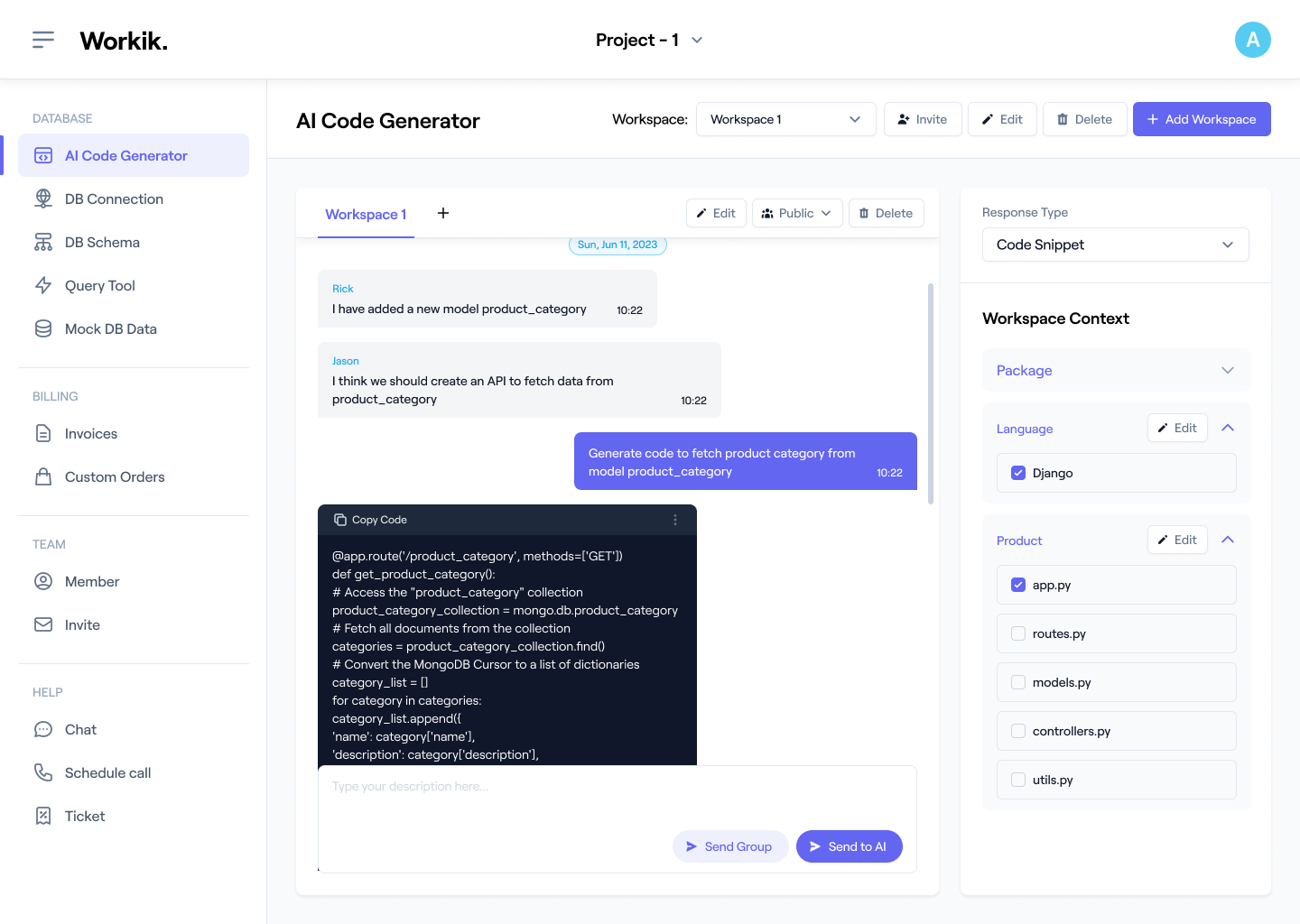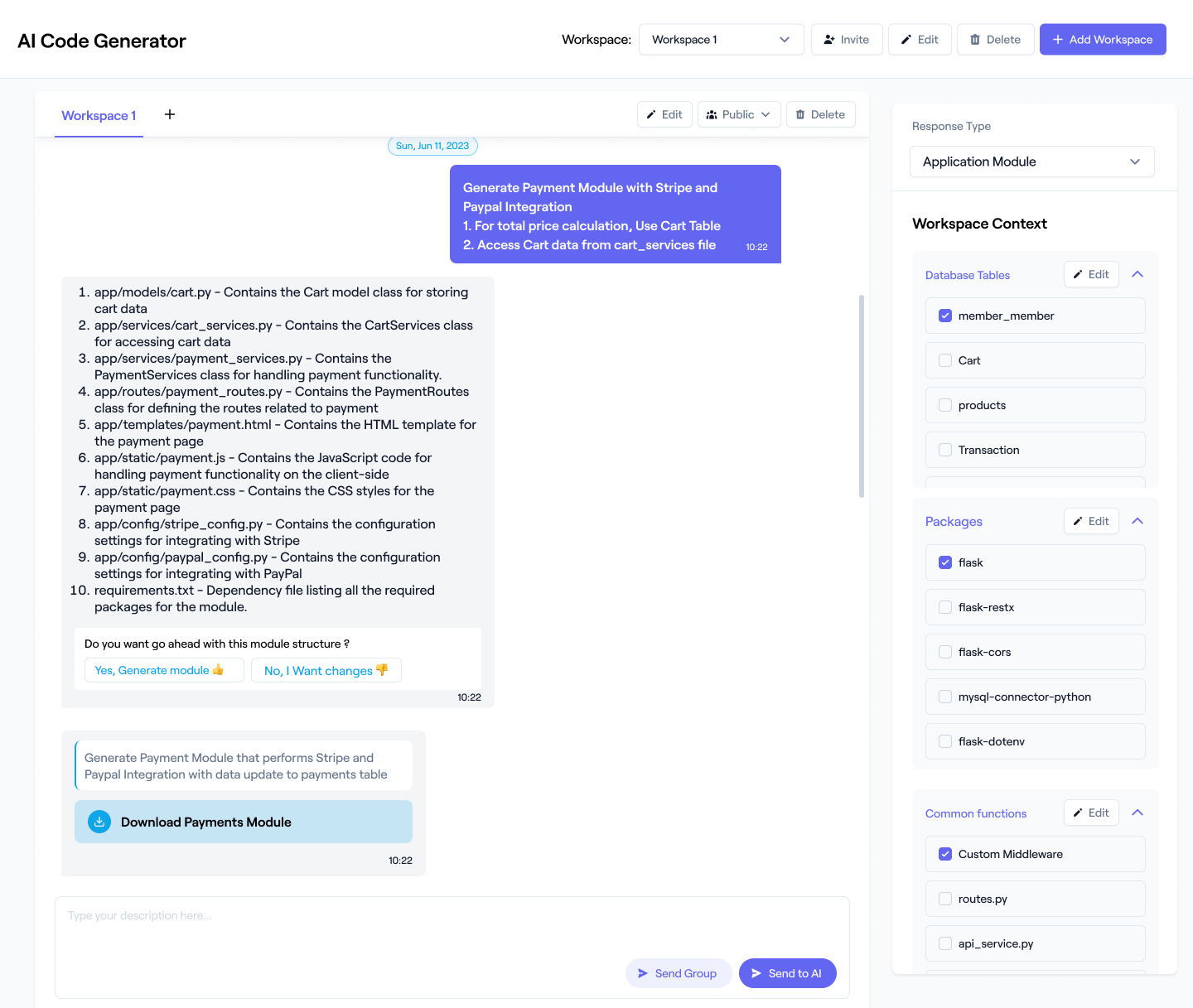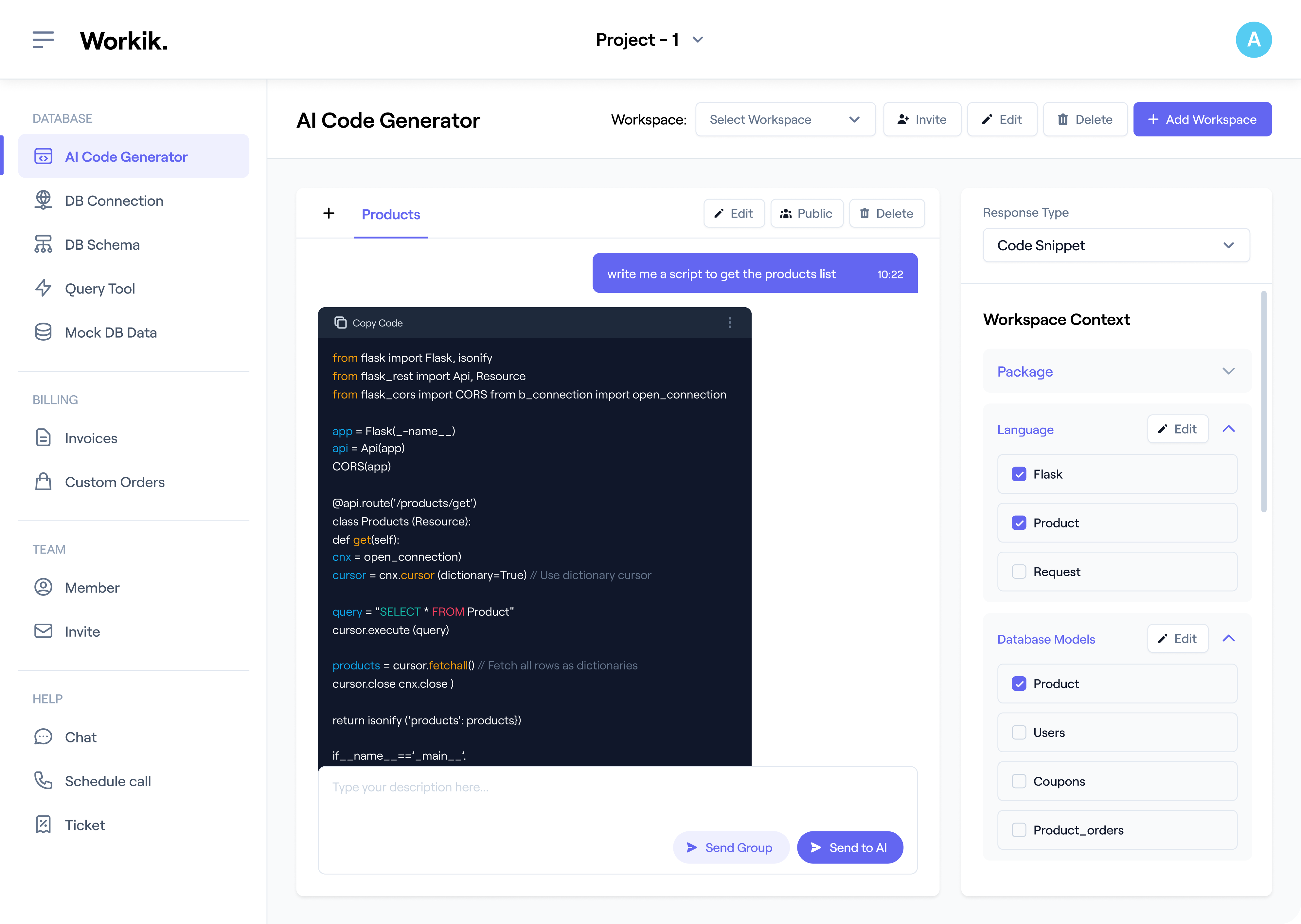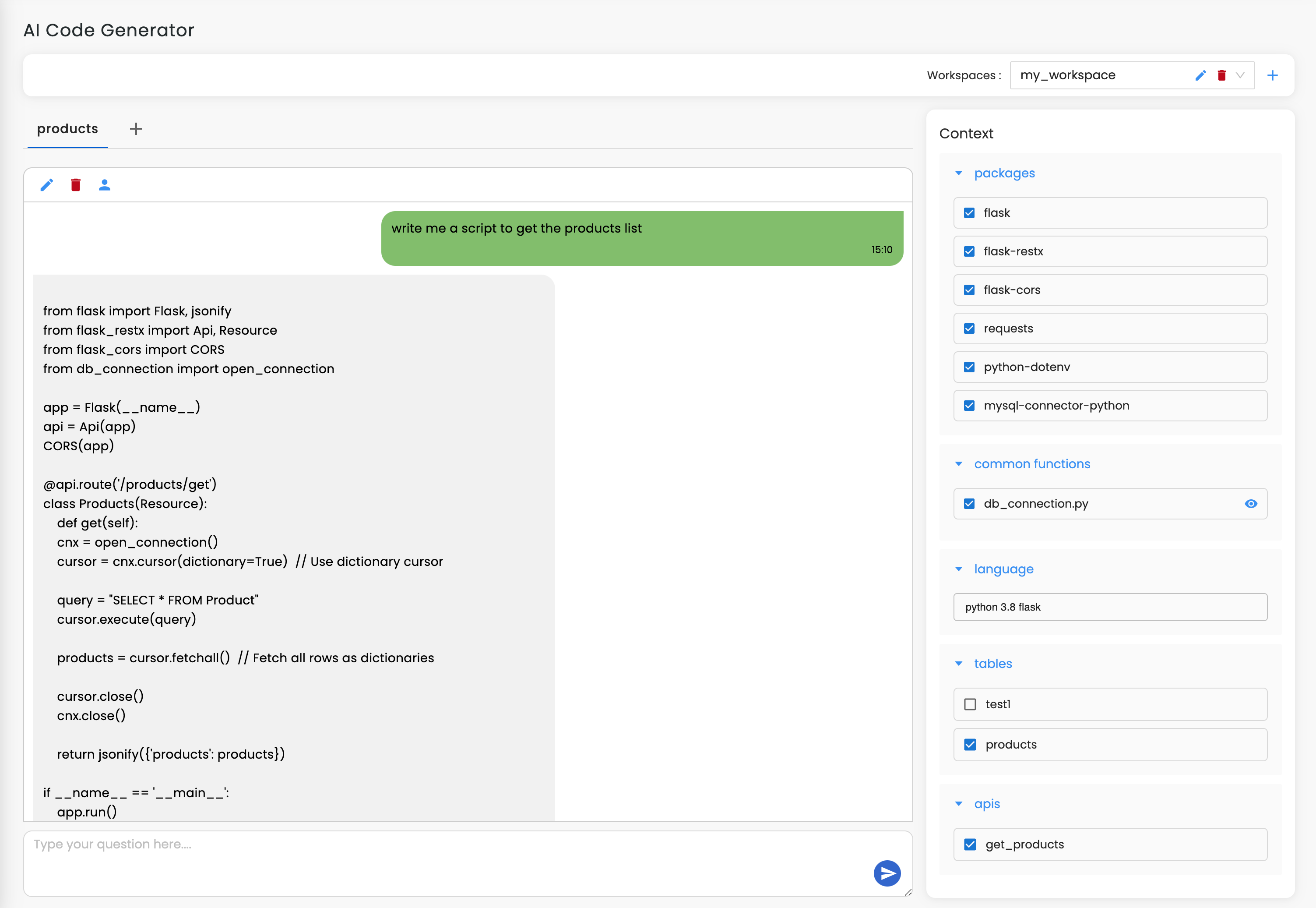
Join our community to see how developers are using Workik AI everyday.
Features

Enforce Code Consistency
AI applies Prettier for JavaScript and Black for Python, enforcing consistent styles across teams and simplifying code reviews.

Automate Pipeline Formatting
AI manages code formatting with Husky, integrating ESLint and Clang-Format to enforce style rules before merging in CI/CD workflows.

Enhance Code Readability
AI reformats Ruby with Rubocop and Go with Gofmt, improving clarity and easing navigation in large-scale projects.

Tailor Code Formatting
Customize formatting rules with AI using EditorConfig and Stylelint, adjusting indentation, line breaks, & more to fit project guidelines.
How it works
Register with Google or manually create an account to access Workik’s AI-driven code formatting tools.
Sync your codebase from GitHub, GitLab, or Bitbucket, and specify languages like JavaScript, Python, or more. Add your project’s linter configurations such as ESLint or Black for more precise formatting.
Leverage AI to format your code based on the defined rules. Whether it's applying Prettier for JavaScript or Rubocop for Ruby, AI ensures your code meets style guidelines across the entire codebase.
Invite your team to the workspace to collaboratively refine formatting, run automated checks in CI/CD pipelines, and use AI-driven insights to enhance code readability and consistency.


Expand


Expand


Expand


Expand


Expand


Expand


Expand


TESTIMONIALS
Real Stories, Real Results with Workik
Workik’s AI formatter keeps our JavaScript clean and consistent. Huge time saver!

Jenna Castillo
Front-End Developer
As a junior, Workik’s AI formatter helped me follow team standards right away. It's a game-changer!

Darwin Stuart
Junior Developer
Workik keeps our code clean and readable across multiple languages. Fast and reliable!

Robbie Walker
Tech Lead
What are some popular use cases of Workik's AI-powered Code Formatter?


Workik’s AI-powered Code Formatter is ideal for use cases such as:
* Ensuring consistent code formatting across large teams.
* Automating pre-commit formatting with Husky.
* Enforcing style rules in CI/CD pipelines with ESLint, Prettier, and Black.
* Maintaining readable, clean code in multi-language projects like JavaScript, Python, Ruby, and Go.
* Reducing manual formatting during code reviews.
What context-setting options are available in Workik’s AI for Code Formatter?


Workik offers diverse context-setting options for the Code Formatter by allowing users to:
* Define programming languages like JavaScript, Python, Ruby, or Go.
* Set up formatters such as Prettier, Black, or Rubocop.
* Sync repositories from GitHub, GitLab, or Bitbucket.
* Configure linters like ESLint or Stylelint.
* Use EditorConfig for custom rules on indentation, line breaks, and quotes.
How does Workik improve code reviews?


By formatting code automatically, Workik allows reviewers to focus on logic and functionality instead of style issues, speeding up the review process and reducing errors in multi-developer teams.
Can Workik handle multiple languages in one project?


Yes, Workik supports multi-language projects by allowing different formatters for each language. Use Prettier for JavaScript, Black for Python, and Rubocop for Ruby, ensuring consistency across the stack.
Can Workik be integrated into CI/CD pipelines?


Yes, Workik integrates with CI/CD to automatically format code using tools like ESLint, Prettier, or Clang-Format. This ensures code follows style rules before merging, maintaining quality throughout the development cycle.
Who benefits most from Workik’s Code Formatter?


Teams working on large, multi-language projects or those enforcing strict code standards benefit the most. Whether it’s a JavaScript front-end, Python back-end, or a full-stack app, Workik ensures clean, readable code.
Generate Code For Free

Code Formatting: Question & Answer
Developers use code formatters to ensure consistent styles, improve readability, and enforce rules. Tools like Prettier, Black, and Rubocop automate formatting, reduce manual reviews, and prevent style-related bugs, enhancing code quality across languages like JavaScript, Python, and Ruby.
Popular tools for code formatting include:
Languages:
JavaScript, Python, Ruby, Go, TypeScript, Java, PHP, Swift, C#
Formatters:
Prettier, Black, Rubocop, Gofmt, Clang-Format
Framework Support:
React, Angular, Django, Ruby on Rails, Spring Boot
CI/CD Integration:
Husky, Jenkins, GitHub Actions, Travis CI
IDE Support:
VS Code, PyCharm, WebStorm, JetBrains IDEs
Popular use cases of code formatting include but are not limited to:
Code Consistency:
Ensures uniform indentation and spacing in JavaScript, Python, Ruby.
CI/CD Integration:
Automates formatting with ESLint, Prettier, and Clang-Format.
Pre-Commit Hooks:
Uses Husky to format code before commits.
Improving Readability:
Reformat complex code with Gofmt, Rubocop, and Black.
Cross-Language Support:
Applies consistent formatting across JavaScript, Python, and Ruby.
Professionals skilled in code formatting can pursue roles such as Frontend Developer, Backend Developer, Full Stack Developer, DevOps Engineer, Technical Lead, and Code Reviewer.
Workik AI automates code formatting by:
Automates Code Formatting:
Automates code formatting across your entire project with AI-driven tools.
Ensures Consistency:
Ensures uniform styles in every commit by enforcing consistent formatting.
Seamless Integration:
Integrates seamlessly into workflows, applying formatting automatically.
Reduces Manual Effort:
Reduces manual effort by handling code formatting across teams and pipelines.
Improves Code Quality:
Improves code quality by maintaining clean and readable code throughout development.
Speeds Up Reviews:
Speeds up code reviews by eliminating style issues before code reaches the review stage.
Explore more on Workik
Get in touch
Don't miss any updates of our product.
© Workik Inc. 2026 All rights reserved.

